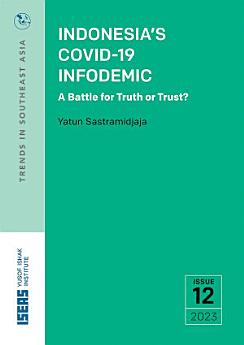Indonesia’s COVID-19 Infodemic: A Battle for Truth or Trust?
About this ebook
On Indonesian social media, this infodemic engendered a peculiar type of hybrid narrative, combining global conspiracy theories with local moral economies and religious sentiments. Religious micro-influencers were particularly influential in spreading the narrative that the government’s COVID-19 policies could not be trusted, and that COVID-19 vaccines were dangerous and haram. Such posts were often removed in line with the social media platforms’ policies to combat false information on COVID-19, and the individuals who created such content risked prosecution in line with the government’s punitive approach to “hoaxes”. However, this did not lessen the prevalence of anti-vaccine narratives, nor did it mitigate public distrust of the government.
The government also contributed to the spiral of distrust through its inconsistent policies, lack of transparency, and mixed messages. Especially in the pandemic’s early phases, government officials themselves were found spreading misleading information, first to downplay the severity and risk of COVID-19 in order to avoid social unrest, and subsequently to push for a quick reopening of the economy. In prioritizing the economy over public health, considerable resources were spent on influence campaigns to persuade the public to continue business as normal.
The influence campaigns appeared to succeed in persuading people to return to work and to get vaccinated eventually. However, public distrust remained and was easily reactivated on social media in response to inconsistencies and double standards in the government’s enforcement of COVID-19 restrictions.
About the author
Yatun Sastramidjaja is Assistant Professor in Anthropology at the University of Amsterdam, and an Associate Fellow with the Regional Social and Cultural Studies Programme at the ISEAS – Yusof Ishak Institute, Singapore.




